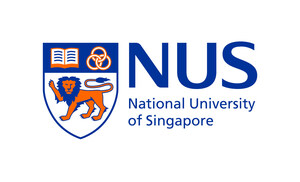These novel solar cells achieve an impressive stabilised efficiency of 24.35% - the highest for perovskite solar cells (active area of 1 cm2) to date
SINGAPORE, June 22, 2023 /PRNewswire/ -- Perovskite solar cells designed by a team of scientists from the National University of Singapore (NUS) have attained a world record efficiency of 24.35% with an active area of 1 cm2. This achievement paves the way for cheaper, more efficient and durable solar cells.
To facilitate consistent comparisons and benchmarking of different solar cell technologies, the photovoltaic (PV) community uses a standard size of at least 1 cm2 to report the efficiency of one-sun solar cells in the "Solar Cell Efficiency Tables". Prior to the record-breaking feat by the NUS team, the best 1-cm2 perovskite solar cell recorded a power conversion efficiency of 23.7%. This ground-breaking achievement in maximising power generation from next-generation renewable energy sources will be crucial to securing the world's energy future.
Perovskites are a class of materials that exhibit high light absorption efficiency and ease of fabrication, making them promising for solar cell applications. In the past decade, perovskite solar cell technology has achieved several breakthroughs, and the technology continues to evolve.
"To address this challenge, we undertook a dedicated effort to develop innovative and scalable technologies aimed at improving the efficiency of 1-cm2 perovskite solar cells. Our objective was to bridge the efficiency gap and unlock the full potential of larger-sized devices," said Assistant Professor Hou Yi, leader of the NUS research team comprising scientists from the Department of Chemical and Biomolecular Engineering under the NUS College of Design and Engineering as well as the Solar Energy Research Institute of Singapore (SERIS), a university-level research institute in NUS.
He added, "Building on more than 14 years of perovskite solar cell development, this work represents the first instance of an inverted-structure perovskite solar cell exceeding the normal structured perovskite solar cells with an active area of 1 cm2, and this is mainly attributed to the innovative charge transporting material incorporated in our perovskite solar cells. Since inverted-structure perovskite solar cells always offer excellent stability and scalability, achieving a higher efficiency than for normal-structured perovskite cells represents a significant milestone in commercialising this cutting-edge technology."
This milestone achievement by Asst Prof Hou Yi and his team has been included in the Solar Cell Efficiency Tables (Version 62) in 2023. Published by scientific journal Progress in Photovoltaics on 21 June 2023, these consolidated tables show an extensive listing of the highest independently confirmed efficiencies for solar cells and modules.
Low-cost, efficient and stable solar cell technology
The record-breaking accomplishment was made by successfully incorporating a novel interface material into perovskite solar cells.
"The introduction of this novel interface material brings forth a range of advantageous attributes, including excellent optical, electrical, and chemical properties. These properties work synergistically to enhance both the efficiency and longevity of perovskite solar cells, paving the way for significant improvements in their performance and durability," explained team member Dr Li Jia, postdoctoral researcher at SERIS.
The promising results reported by the NUS team mark a pivotal milestone in advancing the commercialisation of a low-cost, efficient, stable perovskite solar cell technology. "Our findings set the stage for the accelerated commercialisation and integration of solar cells into various energy systems. We are excited by the prospects of our invention that represents a major contribution to a sustainable and renewable energy future," said team member Mr Wang Xi, an NUS doctoral student.
Towards a greener future
Building upon this exciting development, Asst Prof Hou and his team aim to push the boundaries of perovskite solar cell technology even further.
Another key area of focus is to improve the stability of perovskite solar cells, as perovskite materials are sensitive to moisture and can degrade over time. Asst Prof Hou commented, "We are developing a customised accelerating aging methodology to bring this technology from the lab to the fab. One of our next goals is to deliver perovskite solar cells with 25 years of operational stability."
The team is also working to scale up the solar cells to modules by expanding the dimensions of the perovskite solar cells and demonstrating their viability and effectiveness on a larger scale.
"The insights gained from our current study will serve as a roadmap for developing stable, and eventually, commercially-viable perovskite solar cell products that can serve as sustainable energy solutions to help reduce our reliance on fossil fuels," Asst Prof Hou added.
Read more - https://news.nus.edu.sg/perovskite-solar-cells-set-new-world-record-for-power-conversion-efficiency/
About National University of Singapore (NUS)
The National University of Singapore (NUS) is Singapore's flagship university, which offers a global approach to education, research and entrepreneurship, with a focus on Asian perspectives and expertise. We have 16 colleges, faculties and schools across three campuses in Singapore, with more than 40,000 students from 100 countries enriching our vibrant and diverse campus community. We have also established our NUS Overseas Colleges programme in more than 15 cities around the world.
Our multidisciplinary and real-world approach to education, research and entrepreneurship enables us to work closely with industry, governments and academia to address crucial and complex issues relevant to Asia and the world. Researchers in our faculties, research centres of excellence, corporate labs and more than 30 university-level research institutes focus on themes that include energy; environmental and urban sustainability; treatment and prevention of diseases; active ageing; advanced materials; risk management and resilience of financial systems; Asian studies; and Smart Nation capabilities such as artificial intelligence, data science, operations research and cybersecurity.
For more information on NUS, please visit nus.edu.sg.
SOURCE National University of Singapore

WANT YOUR COMPANY'S NEWS FEATURED ON PRNEWSWIRE.COM?
Newsrooms &
Influencers
Digital Media
Outlets
Journalists
Opted In





Share this article